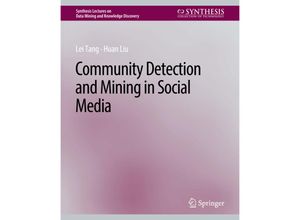The past decade has witnessed the emergence of participatory Web and social media bringing
people together in many creative ways. Millions of users are playing tagging working and
socializing online demonstrating new forms of collaboration communication and intelligence
that were hardly imaginable just a short time ago. Social media also helps reshape business
models sway opinions and emotions and opens up numerous possibilities to study human
interaction and collective behavior in an unparalleled scale. This lecture from a data mining
perspective introduces characteristics of social media reviews representative tasks of
computing with social media and illustrates associated challenges. It introduces basic
concepts presents state-of-the-art algorithms with easy-to-understand examples and recommends
effective evaluation methods. In particular we discuss graph-based community detection
techniques and many important extensions that handle dynamic heterogeneous networks in social
media. We also demonstrate how discovered patterns of communities can be used for social media
mining. The concepts algorithms and methods presented in this lecture can help harness the
power of social media and support building socially-intelligent systems. This book is an
accessible introduction to the study of emph{community detection and mining in social media}.
It is an essential reading for students researchers and practitioners in disciplines and
applications where social media is a key source of data that piques our curiosity to understand
manage innovate and excel.This book is supported by additional materials including lecture
slides the complete set of figures key references some toy data sets used in the book and
the source code of representative algorithms. The readers are encouraged to visit the book
website for the latest information.Table of Contents: Social Media and Social Computing Nodes
Ties and Influence Community Detection and Evaluation Communities in Heterogeneous
Networks Social Media Mining

